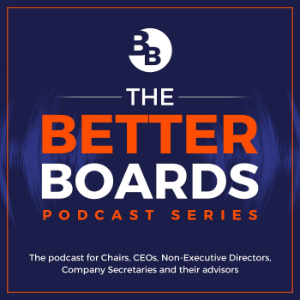
The Better Boards Podcast Series
Business & Economics Podcasts
The Better Boards podcast series is the podcast for Chairs, CEOs, Non-Executive Directors, Company Secretaries, and their advisors.
Every episode is filled with practical insights and learnings from those inside the boardrooms. We tease out what really matters and highlight actionable steps you can take to enhance the performance of your board.
Location:
United Kingdom
Description:
The Better Boards podcast series is the podcast for Chairs, CEOs, Non-Executive Directors, Company Secretaries, and their advisors. Every episode is filled with practical insights and learnings from those inside the boardrooms. We tease out what really matters and highlight actionable steps you can take to enhance the performance of your board.
Language:
English
Contact:
00447760590405
Website:
https://better-boards.com/
Governance Experts as Non-Executive Directors: A perfect fit? | Lyn Colloff, Company Secretary
Duration:00:18:01
Do governance professionals make good Non-Executive Directors? | Lyn Colloff, Company Secretary
Duration:00:24:36
Going beyond the routine change
Duration:00:21:12
From Gatekeeper to Guide: How Governance Professionals Are Shaping the Boardrooms of Tomorrow
Duration:00:24:36
Steering the Shift: Board Leadership in Times of Transformation | Lan O'Connor, NED & Strategic Advisor
Duration:00:26:21
The Role of the Board in Owner-led Organisations
Duration:00:19:35
Overcoming misconceptions and lies in the boardroom
Duration:00:19:38
10x Your Impact – How the Smartest Directors Are Using AI
Duration:00:21:17
Beyond Minutes: Reimagining the Board Secretary in the Age of AI
Duration:00:21:25
Can AI make better business decisions?
Duration:00:26:22
Boards - What do capital markets think of them? The unfiltered perspective of a credit analyst
Duration:00:19:02
Living with Uncertainty: The Importance of Transformation, Culture, and Talent
Duration:00:20:00
Future proofing the board with AI | Moya Hayhurst, Company Secretary
Duration:00:18:33
Cutting past the noise on the climate/energy transition | David Harris, Sustainable Finance Strategic Initiatives. London Stock Exchange Group
Duration:00:21:37
Employee representation on the board
Duration:00:11:20
The Boardroom Tango: Where strategy meets execution | Carol Ouko-Misiko, Executive & NED
Duration:00:18:35
Navigating Misjudgement: A Practical Framework for Better Board Performance
Duration:00:25:49
Selling Bold Ideas in the Boardroom
Duration:00:25:20
How to lead through complexity
Duration:00:16:50
Crisis & the Board: How to prepare for “Anything"
Duration:00:24:00